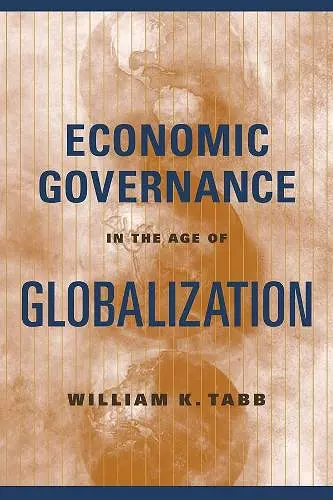Economic Governance in the Age of Globalization
Format:Paperback
Publisher:Columbia University Press
Published:25th Jun '04
Currently unavailable, and unfortunately no date known when it will be back

William Tabb explores the development of global economic institutions like the World Bank and IMF, arguing they represent a new international state that challenges traditional concepts of sovereignty and accountability.
In Economic Governance in the Age of Globalization, William Tabb presents a compelling argument that global economic institutions like the World Bank and the International Monetary Fund represent the formation of a new international state. He contends that traditional concepts of sovereignty, accountability, and equity are no longer sufficient to address the complexities of this emerging global framework. By integrating insights from both economics and political science, Tabb explores the evolution of this global state from the aftermath of World War II and considers its implications for the future.
Tabb critiques the promises made by neoliberal advocates of the Washington consensus, which claimed that rapid economic growth, poverty reduction, and societal stability would result from their policies. He points out that these anticipated benefits have largely failed to materialize, raising important questions about the future of global order and the role of the United States as a dominant power. Tabb emphasizes that, while the U.S. will continue to play a significant role in shaping world governance, it must reevaluate its reliance on outdated models of international free trade.
To adapt to the realities of the 21st century, Tabb argues for the creation of a new financial architecture that incorporates debt forgiveness, multilateral investment agreements, and a more inclusive approach to economic growth. His work challenges readers to rethink the foundations of global economic governance and consider how these institutions can evolve to better serve the needs of a rapidly changing world.
The best critical analysis of the constructing of current economic governance institutions and agendas. Throughout this analysis Tabb shows us how partial a map of this process has been produced by the main scholarly traditions on the subject. This juxtaposition illuminates the contingent character of the current system and the work that can be done to develop alternative objectives. -- Saskia Sassen, author of Losing Control? Sovereignty in an Age of Globalization This is definitely an original and constructive contribution. The book is well written and engaging and the arguments are clear and well formulated. -- Christopher Chase-Dunn, University of California, Riverside The book does a wonderful job of laying out the dilemmas of the current incomplete attempts to govern the global economy, placing them in a historical context that allows us to see viable alternatives. -- Craig N. Murphy, Wellesley College and chair, Academic Council on the U.N. System (2002-2004) His book is an original contribution to the discussion on the current state of globalization. -- Oliver Marnet Journal of Economic Issues Tabb's manuscript on this subject is not a traditional research monograph... He offers a strong critical assessment of the neoliberal economic agenda. -- David H. Bearce International Journal Up-to-date... unusually well informed about the academic literature across economics, IR, IPE, and security studies. -- Robert Hunter Wade Perspectives on Politics The book clearly identifies links between politics and economics in the age of globalization and puts them in an interesting historical perspective -- Dirk-Jan Koch Development and Change
ISBN: 9780231131551
Dimensions: unknown
Weight: unknown
528 pages